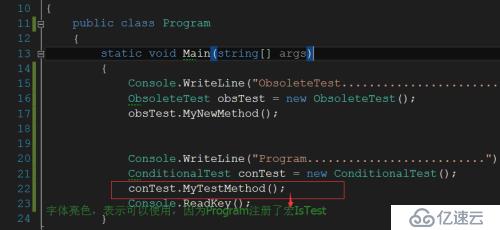您好,登錄后才能下訂單哦!
您好,登錄后才能下訂單哦!
什么是特性,我自己的理解是:
特性是一種允許我們向程序集增加元數據的語言結構。它是用于保存程序結構信息的特殊的類。特性有2個基本概念:“目標”,“消費者”,就拿特殊性DebuggerStepThrough來說,編譯器就是消費者,當它遇到被此特性注冊過的Mothed時,就不會進入此Mothed執行(斷點時)會直接得到此Methed的運行結果,而次Method就是目標了。總而言之,應用了特性的語言結構叫“目標”;設計用來獲取和使用此特性的就叫“消費者”。
下面講解.Net自帶的幾個比較著名的特性
1,Obsolete : 提示Method過時
using System;
using System.Collections.Generic;
using System.Linq;
using System.Text;
namespace AtrributeTest.com
{
/// <summary>
/// 用于測試Obsolete特性
/// 目標:Method
/// 消費者 : IDE
/// </summary>
public sealed class ObsoleteTest
{
[Obsolete("這個方法已經過時,請使用MyNewMethod方法",false)]
public void MyOldMethd()
{
Console.WriteLine("這是一個過時的方法");
}
public void MyNewMethod()
{
Console.WriteLine("這是一個新方法");
}
}
}測試:

可以看出當IDE跳出提示時,會自動在有“Obsolete”標志的Method上劃一橫線(表示不提倡使用),我在Obsolete的構造函數中提示“這個方法已經過時,請使用MyNewMethod方法”也只IDE提示中顯示出來。關于Obsolete的第二個參數(Boolean),它表是“是否不能使用”。如果為true,當使用了MyOldMethd方法后,編譯會報錯;反之(False的情況),只是不提倡使用。
2,Conditional : 取消Method的任何調用
這個的話我認為并沒有編譯參數好用。我先放測試代碼,再給出解釋
1,此內中有一個方法“MyTestMethod”被Conditional特性修飾
using System;
using System.Collections.Generic;
using System.Diagnostics;
using System.Linq;
using System.Text;
namespace AtrributeTest.com
{
/// <summary>
/// 用于測試Condition特性
/// 目標:Method
/// 消費者 : IDE(將影響編譯)
/// </summary>
public sealed class ConditionalTest
{
[Conditional("IsTest")]
public void MyTestMethod()
{
Console.WriteLine("這是我的測試方法,請在正式上線后注釋掉");
}
}
}此方法在2處調用
①:
using System;
using System.Collections.Generic;
using System.Linq;
using System.Text;
namespace AtrributeTest.com
{
/// <summary>
/// 用于測試Obsolete特性
/// 目標:Method
/// 消費者 : IDE
/// </summary>
public sealed class ObsoleteTest
{
[Obsolete("這個方法已經過時,請使用MyNewMethod方法",false)]
public void MyOldMethd()
{
Console.WriteLine("這是一個過時的方法");
}
public void MyNewMethod()
{
Console.WriteLine("這是一個新方法");
ConditionalTest contTest = new ConditionalTest();
contTest.MyTestMethod();
}
}
}②:Main函數
#define IsTest
using System;
using System.Collections.Generic;
using System.Linq;
using System.Text;
using AtrributeTest.com;
namespace AtrributeTest
{
public class Program
{
static void Main(string[] args)
{
Console.WriteLine("ObsoleteTest..........................");
ObsoleteTest obsTest = new ObsoleteTest();
obsTest.MyNewMethod();
Console.WriteLine("Program..........................");
ConditionalTest conTest = new ConditionalTest();
conTest.MyTestMethod();
Console.ReadKey();
}
}
}在Program中我定義了一個宏 IsTest , 所以在此類的Main函數中MyTestMethod是可以被執行的。但是在ObsoleteTest內中沒有定義此宏,所以此類的方法MyNewMethod中的MyTestMethod是不會被執行的。這點值得注意。實際上在IDE中已經給予了提示:
在注冊過IsTest宏的Program類,如下圖:

在沒有注冊過宏IsTest宏的ObsoleteTest類,如下圖:

值得注意注意的是 ,① 宏一定要放在所有using的前面 ; ②宏的定義要與[Conditional("IsTest")]后面的參數一樣,但是不能要“”(引號)
但是如果整個項目的此Method都能/不能調用 , 單單一個個在Class中加/刪宏會累死你的 。這里本人有個好方法“預處理指令”在本人的博客《C#的預處理指令的全局設計》中有,但是還有一個此特性還有一個缺點:
所有引用(調用)此Method的地方不會被編譯,但是定義它的地方會被編譯。建議還是使用#if / #endif
自定義特性:(要注意三點)
一:需要繼承Attribute類
二:需要以Attribute單詞作為后綴名
三:最好申明為sealed,需要申明此特性的消費著
好,現在來整一個Demo,現在一步步實現
①建立第一個自定義特性,如下圖

②完整代碼:
using System;
using System.Collections.Generic;
using System.Linq;
using System.Text;
namespace AtrributeTest.com
{
/// <summary>
/// 自定義一個特性
/// </summary>
[AttributeUsage(AttributeTargets.Class)]//表示此特性可以應用到那些程序結構
public sealed class MyTestAttribute : Attribute
{
private string des;
public int Id { get; set; }
public MyTestAttribute(string @des)
{
this.des = des;
}
}
}③使用自定義特性
注意 : 使用反射獲取特性信息

using System;
using AtrributeTest.com;
namespace AtrributeTest
{
[MyTest("我的第一個特性",Id = 1)]
public class Program
{
private static void Main(string[] args)
{
Type @ty = typeof (Program);
object[] arr = ty.GetCustomAttributes(false);//是否搜索父類上的特性
MyTestAttribute my = arr[0] as MyTestAttribute;
Console.WriteLine("特性類的des : {0}" , my.des);
Console.WriteLine("特性類的ID號 : {0}" ,my.Id);
Console.ReadKey();
}
}
}
免責聲明:本站發布的內容(圖片、視頻和文字)以原創、轉載和分享為主,文章觀點不代表本網站立場,如果涉及侵權請聯系站長郵箱:is@yisu.com進行舉報,并提供相關證據,一經查實,將立刻刪除涉嫌侵權內容。